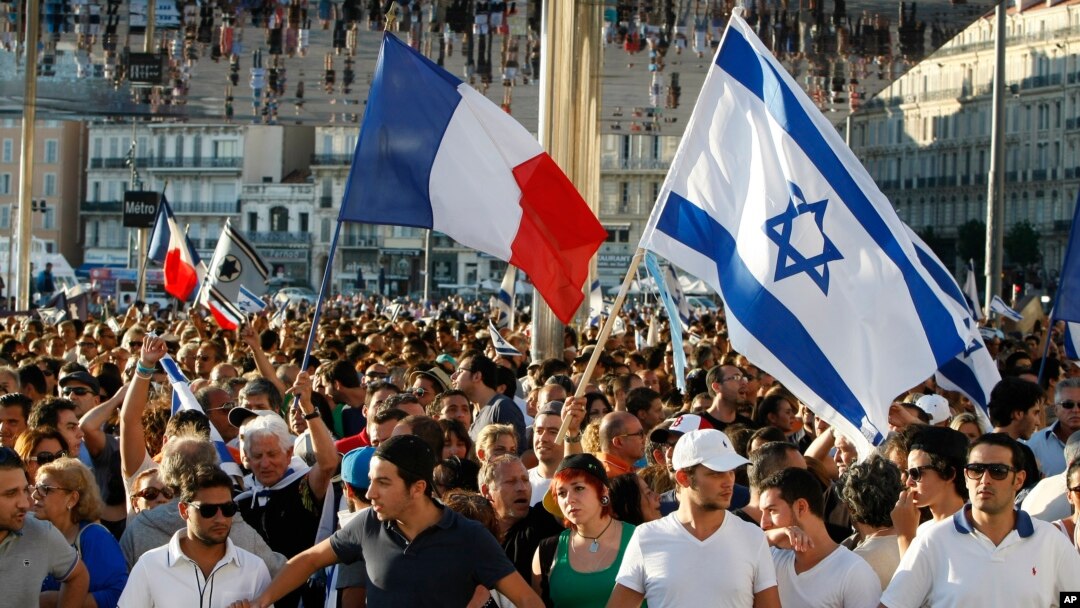The conflict in Gaza is unleashing strong and sometimes violent passions in France, home to Europe's largest communities of Jews and Muslims. It is also feeding fringe groups such as the small, radical Jewish Defense League.
As French authorities consider banning the movement, its strong tactics are earning praise from some Jews, who feel embattled in their own country.
It’s a summer of unrest in the Middle East – and in France, where tens of thousands of pro-Palestinian protesters have taken to the streets.
Not all the protests have been peaceful. Demonstrators have clashed with police and, in the Paris area, some have attacked Jewish businesses and synagogues.
But the aggression goes two ways.
A group of tough young Jews is fighting back. They call themselves the Jewish Defense League, taking their name – and inspiration – from outlawed movements in Israel and the United States, where the FBI says the U.S. group has engaged in terrorist activity.
In France, the decade-old LDJ has a Facebook page and website. It uses the emblem of Israel's banned far-right Kach party: a raised fist inside a black Star of David. One posted video pans from Hamas activists to pro-Palestinian protesters, with a tagline: "France under the influence."
Fighting anti-Semitism?
The league did not respond to VOA’s interview requests. But in a January interview with Israeli TV posted on YouTube, one member said French police were incapable of protecting the Jewish community from anti-Semitic attacks. That, he said, is why the league exists.
Many do not agree. Critics claim LDJ members beat up young Muslims and attack Jews critical of Israel.
Among those petitioning to abolish the group is Abdallah Zekri, head of the Observatory Against Islamophobia, a branch of France's Muslim Council. He said the league preaches hatred and insults Islam, on its website, as a religion of violence and of killers. He called that kind of rhetoric unacceptable.
Jews are also critical. French Jewish Union for Peace member Richard Wagman, who joined recent pro-Palestinian rallies, described the LDJ as a far-right, racist group.
"The Jewish Defense League doesn't defend too many people and certainly not the Jews,” Wagman said. “So we don't have anything to do with that group, and they don't have much to do with the Jewish people.”
Roger Cukierman, president of the Representative Council of French Jewish Institutions, dismisses the league as a marginal group with only a few hundred members, at most.
"Their methods do not apply to a community like ours, which needs moderate people at its head,” Cukierman said. “We don't want to enter into that kind of situation."
Quiet support for league
But some Jews quietly cheer on the league on. The last decade has witnessed a spike in anti-Semitic attacks in France, coupled with an equally worrying rise of radical Islam. The gang killing of a young Jewish man outside Paris in 2006, the 2012 shooting deaths of four Jews in Toulouse, and May's attack on a Brussels Jewish Museum have cemented feelings among some Jews that they are no longer safe in France.
Those views were on display last week at a pro-Israel demonstration in Paris. Under tight police protection, several thousand Jews waved French and Israeli flags and sang the two national anthems.
Business owner Marc Ben Attar, who joined the rally, said he is no fan of militia groups. He said the Jewish Defense League acts in unconventional and illegal ways. But in France, young [Jewish] people are attacked every day and the community needs to defend itself.
Jean-Yves Camus, an expert on far-right groups, said Jews also remain haunted by the Holocaust.
"Since 1945, there is a feeling among the Jews in the diaspora that had Jews been united and able to set up a self-defense organization …maybe the genocide would have taken place, but more youth could have been saved," Camus said.
Authorities consider bans
The situation is very different today, but the need for self-defense remains strong. Still, while the LDJ's popularity is growing, Camus said it remains nasty, strident – and small.
As the Gaza conflict simmers, other fringe groups are gaining traction in France. Some call themselves peaceful. Other protesters have brandished banners embracing radical Islam.
French authorities are considering whether to ban the LDJ and other groups viewed to be "problematic." For years, the government has warned against the risk of importing the Middle East conflict to France, but, in some ways, that may have already happened.


